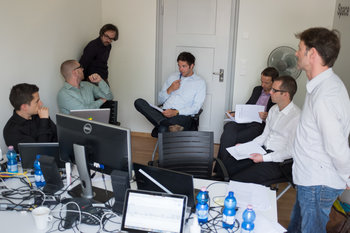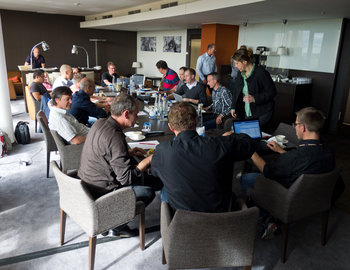
Division of LaborWork is divided into tasks and assigned to different people to improve productivity. | Specialization of LaborWorkers with specialized skills complete specialized tasks in order to improve productivity and quality. |
Interchangeable PartsStandardize things so that they can be easily replaced. | Pareto PrincipleThe first 20% of effort may produce 80% of results. |
Unity of CommandEmployees are to be given consistent directions from management. | Authority Equals AccountabilityAuthority and accountability can’t be detached. Workers with little authority or influence in an organization can’t be blamed for major problems. |
Esprit de CorpsA sense of teamwork, belonging, camaraderie and purpose improve productivity and creativity. | Contingency TheoryThere is no ideal management style. Style is adapted to the demands of each situation. |
Systems TheoryViewing organizations as complex systems whereby changes can have unintended consequences. | Theory of ConstraintsViews an organization as being limited by bottlenecks known as constraints. Where these are removed, an organization improves. Based on the idea that a chain is only as strong as its weakest link. |
Keep it SimpleThe theory that organizations have an irrational preference for complexity whereby doing things the simplest way would massively improve efficiency. | Appreciative InquiryLooking at what is working and scaling that as opposed to focusing on problems. |
Theory XThe common assumption that employees are inherently untrustworthy and need to be monitored and controlled. | Theory YThe common assumption that employees are motivated, responsible and talented and need only be provided with opportunity to thrive. |
Dilbert PrincipleThe theory that incompetent employees are quickly promoted to management to limit the damage they can do in a hands-on role. | Magical UnicornThe theory that management is often seeking a magical solution to all problems such as a trendy new technology or management approach. |
Scientific ManagementA late 19th century theory that has been so widely adopted that its mostly considered self-evident and obvious now. Calls for analysis, standardization, logic, work-ethic and the use of data. | Bureaucratic Management TheoryStructuring organizations into a controlled hierarchy and meritocracy with a clear change of command. Also calls for systematic processes, rules and procedures. |
Motivation-Hygiene TheorySome benefits motivate workers while others are simply expected as an entitlement. | Parkinson's Law of TrivialityThe theory that management will avoid complex problems that are difficult to solve in favor of trivial problems that are more easily understood. Also known as bike shedding. |
Parkinson's LawThe theory that work expands to consume the budget and schedule available. | Creativity of ConstraintsThe theory that constraints such as low budget and short timelines lead to more creative work outputs. |
Hawthorne EffectEmployees alter their behavior when they feel they are being observed. Can have both negative and positive impacts. | Parkinson's Law of BureaucracyBureaucratic organizations tend to grow even where workloads are constant or in decline. |
Mythical Man-MonthThe rule of thumb that adding more people to a late project only makes it later. | Treadmill of ProductivityThe faster you work, the faster you will be given more work. Many employees will adapt to this to slow their delivery. |
Underpants GnomesThe theory that strategies are often missing a critical step. | Parkinson's Law of CommitteesA tendency for group decisions to be risk-adverse out of a desire to avoid controversy. |
Abilene ParadoxThe tendency for group decisions to be fully irrational. Suggests that decisions are better made by a named person with authority and accountability. | Triple Bottom LineFirms that target revenue, social and environmental goals as opposed to just revenue. |
Stakeholder TheoryThe theory that everyone that is impacted by a firm is a stakeholder in that firm. | KaizenThe philosophy of slow but continuous improvement as opposed to dramatic shifts and changes. |
GenbaJapanese meaning “the actual place.” Advocates for managers being immersed in things where they actually occur such as a restaurant CEO who spends much time at the chain’s restaurants. | NemawashiThe process of building support for a change long before it is announced. A Japanese approach that can be translated “turning the roots.” |
Muda, Mura, MuriThe three sources of waste in an organization that can be translated: low value activities, inconsistency and overburden. | 5-whysThe process of asking why five times in succession to dig deeper into issues. |
YokotenSharing what works across departments. | Law of HolesIf you find yourself in a hole, stop digging. Relates to escalating commitment and failure is not an option. |
Corporate NarcissismThe theory that groups can take on narcissistic qualities whereby they are overconfident, unrealistic and disconnected from customer and competitive reality. | Radical TransparencyThe theory that secrecy doesn’t create competitive advantage but rather impedes it. |
Last Responsible MomentDelaying decisions, planning and work until they really need to be done. | Ship OftenAn approach to value creation that gets real things out in the real world quickly so that they can be improved with feedback. |
Creative TensionThe theory that group harmony sacrifices creative progress such that turbulent organizations are more likely to succeed. | Heliotropic EffectThe theory that people move towards the most beautiful vision they have of themselves. If you see a big future for everyone on your team they may actually move towards this vision. |










































